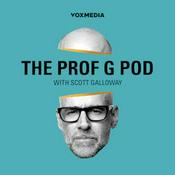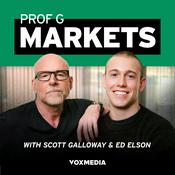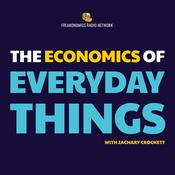15 episodes
Unlocking the Secrets of Specialty Finance with Coromandel Capital's Co-Founder and Managing Partner, Rob McGregor
24/10/2025 | 1h 20 mins.Launched in 2019, Coromandel Capital offers flexible, non-dilutive, growth-oriented asset-based lending solutions to businesses in specialty finance, fintech, and technology-enabled sectors that generate predictable, recurring revenue. As one of the few non-bank lenders specializing in small-ticket debt capital solutions, Coromandel Capital and similar entities—willing to provide financings below $20 million—are vital players for capital-intensive specialty lenders. The firm's financings typically range from $5 million to $50 million and have a three-year term.
Co-Founder and Managing Partner Rob McGregor and I engaged in discussions on a variety of topics, including:
- The role of debt financing in empowering startups and other early-stage and growing companies, particularly in relation to venture capital funding.
- The risks associated with double pledging assets, including explanations thereof, especially in light of the recent collapse of First Brands.
- The utilization of debt as a strategic tool for business growth.
- The hidden costs related to venture debt.
- The untapped potential inherent in the specialty finance sector.
- The significance of diligent monitoring within lending relationships.
- Strategies for growing as a private lender while safeguarding and maintaining capital.
- Navigating the crowded and competitive private, non-bank lending industry to establish enduring relationships with borrowers and investors.
Among the characteristics Coromandel seeks in ideal borrower partners are:
- Balance-sheet intensive businesses (those originating or acquiring assets, tangible or intangible) that would otherwise finance these assets through equity.
- Companies that have raised equity from Seed to Series B (or similar stages within their lifecycle), possess adequate capitalization to support operational expenses and maintain sufficient 'runway,' with a portion of this equity potentially serving as a contribution (also known as "haircut capital," "first loss capital," or "overcollateralization") for Coromandel's credit facility.
- Subject matter experts and/or executives who are trailblazers with deep industry roots, a robust track record, and a validated business model.
- Companies operating within sizable markets and differentiating themselves through cost-effective customer acquisition strategies, as well as firms that have identified an untapped or "greenfield" opportunity to address underserved or unserved markets.
“Thank you for joining the Asset Backed podcast. To catch all the latest content, subscribe today and follow Endurance Strategies and Andres Sandate on LinkedIn, the Asset Backed YouTube Channel, and find our sister show, ATLalts, anywhere you listen to your podcasts. This audio represents Endurance Strategies' intellectual property.
Podcast Disclaimer
This podcast is produced and hosted by Andres Sandate, and is the property of Endurance Strategies, LLC.
Andres Sandate is a Financial Advisor with Gramercy Park Wealth Advisors, LLC, and a Registered Representative of GPWA, LLC, a member of FINRA/SIPC.
Gramercy Park Wealth Advisors, LLC and GPWA, LLC are not responsible for the content of this podcast and do not offer investment, legal, or tax advice, nor do they recommend or endorse any securities, products, or strategies discussed.
No part of this podcast may be published, reproduced, transmitted, or rebroadcast in any media or any form without the express written permission of Endurance Strategies, LLC.
This podcast does not constitute an offer to sell or a solicitation of an offer to buy any fund interests, securities, or other financial instruments, nor does it constitute a solicitation on behalf of Endurance Strategies, LLC, its affiliates, or any third-party investment managers, their affiliates, products, or strategies. Any such offer or solicitation may only be made pursuant to the delivery of formal offering documents.
Endurance Strategies, LLC has no obligation to update or revise any information contained herein. The company makes no representations or warranties as to the accuracy or completeness of the information, and this podcast should not be relied upon as the basis for investment decisions or for any other purpose.
This material may be protected by copyright. © Endurance Strategies, LLC. All rights reserved.Data-driven real estate lending with Mount North Capital's Brian Seidensticker and Kiah Hochstetler
13/6/2025 | 1h 3 mins.We spend a lot of time speaking with managers and investment professionals across asset-backed finance, asset-based lending, and specialized, niche areas of credit, seeking out teams and platforms that are not just engaged in private credit but are winning due to distinctive, hard-to-replicate edges with competitive moats around their sources of return.
Recently, I sat down with Brian Seidensticker and Kiah Hochstetler, co-founders of Mount North Capital, to discuss how they source and execute opportunistic real estate investments. One standout takeaway from that conversation was this: Mount North’s unique local partner model is a big reason they can consistently find, vet, and turn distressed properties, which most listeners may not associate with private credit, into yield. In addition to their unique partnership model, Mount North Capital utilizes data and in-house proprietary technology, unlike real estate sponsors I have met previously as part of the underwriting.
Here’s the idea in a nutshell:
👉 They combine proprietary data with boots-on-the-ground local expertise.
👉 Local partners — people who know their markets inside and out — act as both the eyes and execution arm for sourcing overlooked distressed real estate that institutional platforms simply can't pursue due to inefficiencies, a lack of data, and their scale.
👉 Many local investors and operators know how to identify attractive opportunities but often lack the capital to scale beyond a few properties at a time.
👉 Mount North steps in with funding, data, and a repeatable process, empowering these local partners to do more deals than they could alone, while Mount North retains ownership and control of the asset throughout. It offers a unique way to gain exposure to short-duration real estate credit, and I found their competitive pillars to be distinctive. One of the biggest advantages Mount North Capital explained in the episode is the combination of the data (just the raw amount is impressive in its own right) and the technology tools they have built internally over the past decade. They utilize it on every single deal for screening and to aid underwriting. They don't pursue deals that waste what is most valuable to all smart capital allocators - time.
The partnership model they have created at Mount North Capital solves two key industry problems in distressed and opportunistic real estate:
1️⃣ It vastly increases deal flow — more local relationships mean access to more auctions, more insider knowledge, and faster boots-on-the-ground diligence. What real estate investor doesn't want to see more deals that fit their investment criteria?
2️⃣ It reduces risk — local partners share upside and have a vested interest in executing on budget and on time. If something goes off track, Mount North still owns the asset outright and can step in directly. No foreclosure, no mortgage, simply an operational decision to move on.
The result? A repeatable, scalable model that taps into local know-how while keeping tight asset-level control and institutional standards.
In a world where many private real estate funds chase the same on-market deals, Mount North’s local partner network is a powerful advantage — one that came up again and again in our conversation.
If you’re an advisor, family office, or investor exploring asset-backed investments in real estate or private credit alternatives with a shorter duration, the Mount North Story is fascinating in my opinion.
Follow Asset Backed and our sister podcast ATLalts for more insights from private market innovators. If you liked the conversation and learned something, we would appreciate it if you left us a positive review. If you found the topic helpful, please tell a friend about our show.
#ATLalts #AlternativeInvestments #MountNorthCapital #RealEstate #PrivateCredit #LocalPartners #DealFlow #PodcastSpecialty Finance Masterclass with Monachil Capital Partners Founder & CIO Ali Meli
09/5/2025 | 55 mins.https://www.atlalts.com/ - Our flagship pod, ATLalts, provides education, insights, and analysis of alts and private markets to RIAs and HNWI
https://www.endurancestrategies.com/ - Learn, invest, educate and partner with us on alts, private markets, and non-traditional strategies
https://sandate.substack.com/ - Check out my blog on asset backed finance
YouTube Video of this episode: https://youtu.be/9OsDqg6bk1g
https://www.linkedin.com/in/sandate/ - Connect with me on LinkedIn
https://calendly.com/sandate - Book time on my calendar
email me at [email protected] or [email protected]
Ali Meli is the Founder, Chief Investment Officer, and Managing Partner of Monachil Capital Partners. Since launching the firm in 2019, Ali has been at the helm of the firm's overall management, guiding strategic initiatives and spearheading investment decisions and capital raising activities.
Prior to establishing Monachil, Ali spent 14 years at Goldman Sachs, where he spearheaded some of the firm's most notable and lucrative structured credit transactions. He most recently served as a Partner and Global Co-Head of Structured Finance, Investing and Lending ("SFIL"). His previous roles included European Co-Head of Principal Funding and Investments ("PFI").
Ali earned a Bachelor of Science in Electrical Engineering and Management Science from the Massachusetts Institute of Technology.
On this episode of Asset Backed, Ali and I discuss a wide variety of topics which specialty finance investors, practitioners, fund managers, and industry participants will find interesting.
Among the many topics Ali & I discussed in this episode:
- His background and motivation behind forming the firm and launching his first fund.
- Evolution of specialty finance from mid 2000s (Prosper, peer to peer)
- The shift to and addition of smaller originators and the key drivers of their success and the magnitude of this change over the longer term
- Why bank business models did not support these smaller originators and their gravitation towards larger credits and borrower relationships
- Why smaller originators are interesting as an asset class and secular trends propelling this part of the credit markets (e.g. reduced cost of technology, AI, data driven decisioning), which could help them grow
Why this episode?
- Non-bank lenders and specialty finance companies across areas such as structured consumer finance, commercial finance, transportation, factoring and invoice financing, MCAs, and ABL require funding partnerships to make loans to customers.
- Firms such as a Monochil provide capital to these niche but massive segments of the lending or credit markets where they have seniority, access to data, books, records, and controls as the senior, first-lien, first position lender.
- Examples of niche credit markets aka specialty finance include non-bank consumer lending, SME and invoicing/receivables financing among many other sub-verticals within what is called specialty finance
- Specialty finance is only just beginning to become familiar to wealth advisors and RIAs, which is one of the key reasons I launched this podcast and run a sister podcast called ATLalts.
- Many RIAs have allocated to large direct lending strategies and stopped looking at additional opportunities to gain exposure in private credit
Why Specialty Finance?
- It is less correlated to corporate sectors
- Lending is moving away from banks
- Banks used to have a monopoly on "lead-gen", "payment infrastructure", "servicing", "consumer data", and "funding". As these four "moats" are being democratized, barriers to entry are easing.
- Funding is turning from a competitive strength for commercial banks to weakness (payment technologies are making them more flighty and elastic)
- What 20 years ago was mainly possible through having a bank account, is now achievable with an investment account (you can simply link your debit card to your brokerage/wealth account)
- Banks are not only losing their monopoly as the source of consumer financing, but also to manage savings for customers...no longer best option for either saving or lending arguably
- All of this creates opportunity for investors to earn attractive risk adjusted returns with private credit firms like Monochil who specialize in lending to niche markets or industries and areas such as structured credit
Disclaimer: Nothing contained herein is, or shall be relied upon as, a promise or representation as to the past or future. This conversation has been prepared solely for informational purposes and is not to be construed as a solicitation or an offer to buy or sell any securities or related financial instruments. Viewers should not construe the contents of this conversation as legal, regulatory, tax, accounting or investment advice or a recommendation. Viewers should consult independent counsel, tax and financial advisors as to legal and related matters concerning any transaction.Strategically Investing and Navigating Through Market Volatility with Brook Scardina, Managing Partner - Capital Markets & Investments, Oak Real Estate Partners
07/4/2025 | 56 mins.Brook Scardina is a Managing Partner - Capital Markets & Investments with Atlanta, GA-based Oak Real Estate Partners (OREP). OREP is an institutional small balance sheet private credit bridge lender that invests in high-quality, short-duration senior-position loans on positive income-producing commercial real estate assets.
Brook and I discussed how investors can think about investing and navigating this period of volatility and market uncertainty, how alternatives and private credit generally, and real estate bridge lending specifically, can help mitigate portfolio volatility, offer enhanced diversification, and attractive risk-adjusted yields.
The investment thesis at OREP is supported by increasing and tighter banking regulations which has created a unique investment opportunity for experienced private credit lenders to fill the lending void in the generation of attractive, uncorrelated returns that enhance diversification.
About Oak Real Estate Partners:
https://www.oakrepartners.com/about/
Brook Scardina Bio:
Brook Scardina is Managing Partner, Capital Markets & Investments, for Oak Real Estate Partners (OREP), where he leads the external capital markets strategy for the national fund manager focused on the institutional investment sector. He is responsible for advising on, solving and delivering alternative investment solutions that support the institutional return objectives of investors including foundations and endowments, sovereign wealth funds, family offices, and corporate and public pension plans.
Over the past two decades, Brook has been involved in the participation and underwriting of more than $12 billion in capital deployed across multiple asset classes including equity, fixed income, diversifying strategies, hedge funds and alternative assets, and complex investment strategies. His career includes roles managing the financial and investment risk complexities for well-known organizations such as the Georgia Tech Foundation, UNC Management Company and UPS Group Trust, a $29-billion defined benefit trust. Immediately prior to joining OREP, Brook was Head of Institutional Consulting for Crescent Wealth Advisory.
Brook, who holds a Series 65 certification from the Financial Industry Regulatory Authority (FINRA), earned master’s degree in business administration from Auburn University and a bachelor’s degree in finance from Georgia Southern University. He has served as a client advisory board member of the Bank of New York Mellon and is the current Chairman of the Board for the Roswell United Methodist Foundation in Atlanta, where he is based.Sreeni Prabhu, co-founder, Managing Partner, Co-CEO & Group Chief Investment Officer, Angel Oak Capital
11/10/2024 | 1h 18 mins.Disclaimer: Nothing contained herein is, or shall be relied upon as, a promise or representation as to the past or future. This conversation has been prepared solely for informational purposes and is not to be construed as a solicitation or an offer to buy or sell any securities or related financial instruments. Viewers, listeners, and subscribers should not construe the contents of this conversation as legal, regulatory, tax, accounting or investment advice or a recommendation. Viewers, listeners, and subscribers should consult independent counsel, tax and financial advisors as to legal and related matters concerning any transaction or financial matter. Any views expressed on this podcast, related websites, related blogs, or other related platforms related to this content that you may visit, watch, or listen to, or any articles, interviews, conversations, or discussions therein, are those of the participants and are not intended as a forecast or as investment recommendations. Information provided are as of the dates described in the content and/or the time of the recording and are subject to change at any time.
Sreeni is a co-founder, Managing Partner and Group Chief Investment Officer at Angel Oak Capital and is responsible for the overall investment strategy of the firm. He is also the Chief Executive Officer and President at Angel Oak Mortgage REIT, Inc. (NYSE: AOMR).
Prior to Angel Oak, Sreeni was the Chief Investment Officer of the investment portfolio at Washington Mutual Bank in Seattle where he managed a $25 billion portfolio. He was also part of the macro asset strategy team at the bank. Sreeni previously worked for six years at SunTrust Bank in Atlanta, where he was responsible for investment strategies and served as Head Portfolio Manager for the $3 billion commercial mortgage-backed securities portfolio. He began his career at SunTrust in 1998 as a Bank Analyst focused on asset/liability management and liquidity strategies.
Sreeni holds a B.B.A. degree in Economics from Georgia College and State University and an M.B.A. in Finance from Georgia State University.
Sreeni and I discussed his backstory which includes his being born and raised in India, his university years as a collegiate tennis player, his first jobs out of college, his career progression in financial services and how that led to the background needed to form Angel Oak, getting his firm started following the GFC with his co-founders, and key decisions and milestones that have allowed Angel Oak to reach its current size and scale.
More Business podcasts
Trending Business podcasts
About Asset Backed
Experts estimate that the asset-based finance (ABF) and specialty finance market represents a $40 trillion opportunity. ABF and specialty finance primarily finance things that touch our daily lives, including housing, medical/healthcare, communication, and the workplace. Additional areas include sports, media, data, education, clean energy, and manufacturing. The Asset Backed podcast by Endurance Strategies, LLC, hosted by Andres Sandate, features in-depth and timely conversations with leaders across these vast, growing, and rapidly evolving credit markets. Conversations with investors and allocators, lenders, NBFI originators, borrowers, bankers, lawyers, data, analytics, and technology infrastructure providers, and many other industry experts will help build your knowledge, understanding, and network across this important area of private credit.
Podcast websiteListen to Asset Backed, Understanding Money with Eoin McGee and many other podcasts from around the world with the radio.net app

Get the free radio.net app
- Stations and podcasts to bookmark
- Stream via Wi-Fi or Bluetooth
- Supports Carplay & Android Auto
- Many other app features
Get the free radio.net app
- Stations and podcasts to bookmark
- Stream via Wi-Fi or Bluetooth
- Supports Carplay & Android Auto
- Many other app features


Asset Backed
Scan code,
download the app,
start listening.
download the app,
start listening.





































